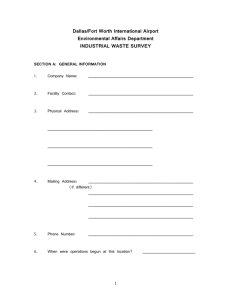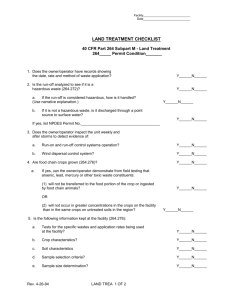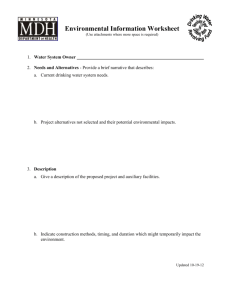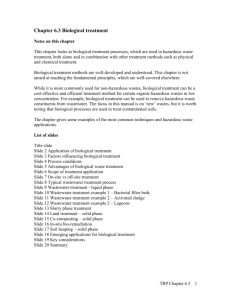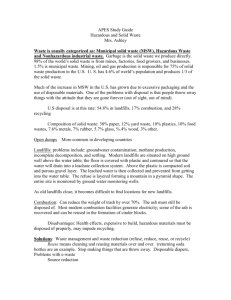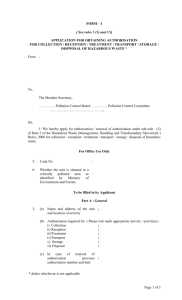Costa Rica - Basel Convention
advertisement
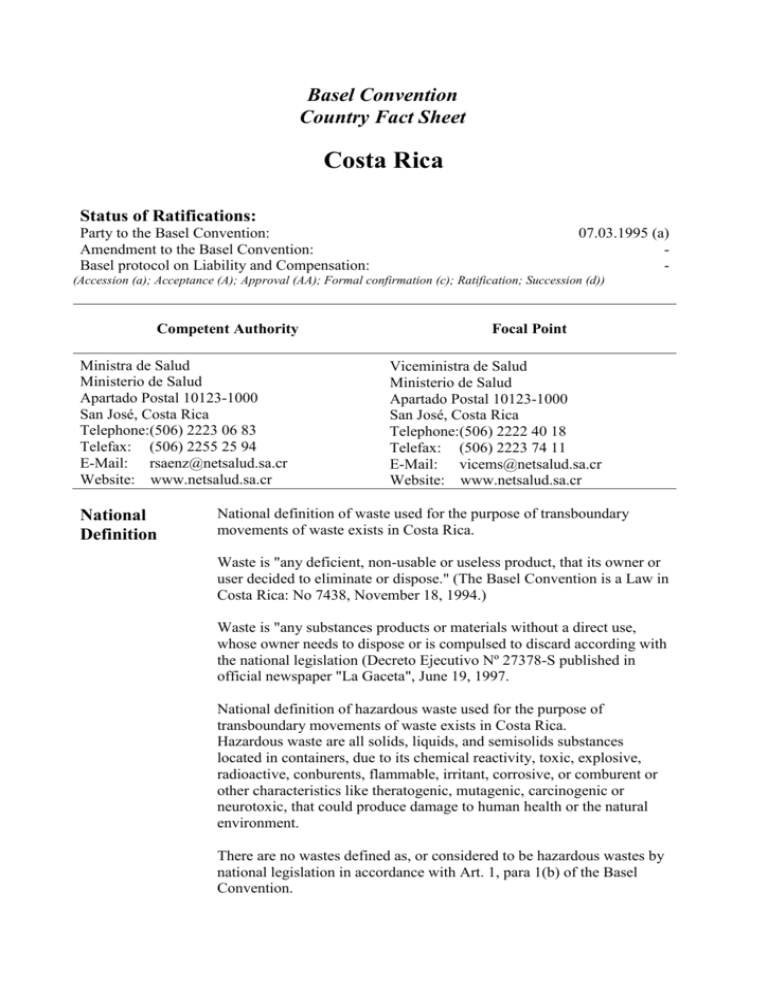
Basel Convention Country Fact Sheet 2002 2006 Costa Rica Status of Ratifications: Party to the Basel Convention: Amendment to the Basel Convention: Basel protocol on Liability and Compensation: 07.03.1995 (a) - (Accession (a); Acceptance (A); Approval (AA); Formal confirmation (c); Ratification; Succession (d)) Competent Authority Ministra de Salud Ministerio de Salud Apartado Postal 10123-1000 San José, Costa Rica Telephone:(506) 2223 06 83 Telefax: (506) 2255 25 94 E-Mail: rsaenz@netsalud.sa.cr Website: www.netsalud.sa.cr National Definition Focal Point Viceministra de Salud Ministerio de Salud Apartado Postal 10123-1000 San José, Costa Rica Telephone:(506) 2222 40 18 Telefax: (506) 2223 74 11 E-Mail: vicems@netsalud.sa.cr Website: www.netsalud.sa.cr National definition of waste used for the purpose of transboundary movements of waste exists in Costa Rica. Waste is "any deficient, non-usable or useless product, that its owner or user decided to eliminate or dispose." (The Basel Convention is a Law in Costa Rica: No 7438, November 18, 1994.) Waste is "any substances products or materials without a direct use, whose owner needs to dispose or is compulsed to discard according with the national legislation (Decreto Ejecutivo Nº 27378-S published in official newspaper "La Gaceta", June 19, 1997. National definition of hazardous waste used for the purpose of transboundary movements of waste exists in Costa Rica. Hazardous waste are all solids, liquids, and semisolids substances located in containers, due to its chemical reactivity, toxic, explosive, radioactive, conburents, flammable, irritant, corrosive, or comburent or other characteristics like theratogenic, mutagenic, carcinogenic or neurotoxic, that could produce damage to human health or the natural environment. There are no wastes defined as, or considered to be hazardous wastes by national legislation in accordance with Art. 1, para 1(b) of the Basel Convention. In Costa Rica there are no wastes other than those pursuant to Art. 1 (1)a and/or Art. 1 (1)b of the Basel Convention that require special consideration when subjected to transboundary movement. Restrictions on Transboundary Movement Amendment to the Basel Convention The amendment to the Basel Convention (Decision III/1) has been implemented in Costa Rica. All amendments have been considered as part of the Basel Convention. Congress approval is not required. Restrictions on export for final disposal Costa Rica has no restrictions on the export of hazardous wastes and other wastes for final disposal. Restrictions on export for recovery Costa Rica has no restrictions on the export of hazardous wastes and other wastes for recovery. Restrictions on import for final disposal Costa Rica restricts the import of hazardous wastes and other wastes for final disposal. La Procuraduría General de la República mediante dictamen C-068-2007 del 2 de marzo del 2007, informa que el Acuerdo Centroamericano Sobre el Transporte Transfronterizo de Desechos Peligrosos, aprobado mediante Ley 7520 publicada en La Gaceta No. 138 de 20 de julio de 1995 se encuentra aún vigente, por lo que según lo dispone el artículo 3.1 Prohibición de importar desechos peligrosos, los países centroamericanos firmantes de este Acuerdo, deben tomar todas las medidas legales, administrativas u otras que fueren apropriadas dentro de las Áreas bajo su jurisdicción para prohibir la importación y tránsito de desechos considerados peligrosos hacia Centro América de países que no sean Partes de este Acuerdo. Restrictions on import for recovery Costa Rica restricts the import of hazardous wastes and other wastes for recovery. Environmental Organic (October 4, 1995) Law and General Health Law (November 24, 1973). The import is limited by regulated list (to be published). The import for recycling is allowed. Restrictions on transit Costa Rica restricts the transit of hazardous wastes and other wastes. Environmental Organic Law other governmental regulations. Reduction and/or Elimination of Hazardous Waste Generation National strategies/policies Policy: Risk to control any factor related with contamination, insecurity and dangers to the environment, the human health and the life of the population; Prevention, mitigation and response to the population needs in disaster situations; Assure the quality of potable water at national scale; and Technical and sanitary management of solid, organic, chemical, biological, radioactive and toxic wastes, among others, in the health, industry and commerce facilities, and houses. Legislation, regulations and guidelines General Health Law of Costa Rica. Strategies: Strengthening of the sanitary regulation based on main standards and technical recommendations; Sanitary monitoring on achieving sanitary regulations; and Development of scientific research towards the protection and the improvement of the human environment. Measures taken by industries/waste generators Application of some environmental principles (sustainable development, precautionary principle, preventive principle); and Development of some mechanisms to reduce the generation of wastes in the starting point. Others Efforts have been made to obtain a significant reduction in the quantity of hazardous wastes in industry and agriculture; these initiatives have received support from the National Cleaner Production Centre (CNP+L), which is seeking to implant alternative technologies in industry, which might be less pollutting and more environmentally-friendly and better for human health. Transboundary Movement Reduction Measures National strategies/policies Policy: Risk to control any factor related with contamination, insecurity and dangers to the environment, the human health and the life of the population; Prevention, mitigation and response to the population needs in disaster situations; Assure the quality of potable water at national scale; and Technical and sanitary management of solid, organic, chemical, biological, radioactive and toxic wastes, among others, in the health, industry and commerce facilities, and houses. Legislation, regulations and guidelines General Health Law of Costa Rica. Strategies: Strengthening of the sanitary regulation based on main standards and technical recommendations; Sanitary monitoring on achieving sanitary regulations; and Development of scientific research towards the protection and the improvement of the human environment. Measures taken by industries/waste generators Application of some environmental principles (sustainable development, precautionary principle, preventive principle); and Development of some mechanisms to reduce the generation of wastes in the starting point. Disposal/ Recovery Facilities No facilities available Bilateral, Multilateral or Regional Agreements - Bilateral; Costa Rica and the United States of America; 2003 -; Agreement for handling of hazardous wastes from industries established in Costa Rica, for their disposal in United States, using capital from that country. - Regional; Central America; 1995 -; Central American Agreement for the control of the transboundary Movement Technical Assistance and Training Available No assistance available Data on the Generation and Transboundary Movements of Hazardous Wastes and Other wastes in 2006 (as reported) Generation Export Import Amount of hazardous wastes generated under Art. 1(1)a (Annex I: Y1-Y45) of BC Amount of hazardous wastes generated under Art. 1(1)b of BC Total amount of hazardous wastes generated Amount of other wastes generated (Annex II: Y46-Y47) Amount of hazardous wastes exported Amount of other wastes exported Amount of hazardous wastes imported Amount of other wastes imported Quantities (in metric tons) 1,245 No data No data No data 2,245 Not reported Not reported Not reported



